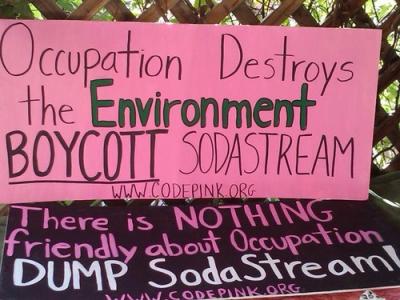
SodaStream greenwashes occupation of Palestine

The Israeli firm SodaStream made a splash earlier this month when its ad was bounced from the Super Bowl—alas, for the wrong reason. CBS deemed that the content of its planned commercial was a direct swipe at two other Super Bowl sponsors, Coke and Pepsi, Advertising Age noted. SodaStream bills itself as environmentally correct, selling machines that carbonate water at home and obviate the need for soda bottles, under the kicker "Set the Bubbles Free." We wish CBS had been more concerned with the boycott that has been called of SodaStream, a firm illegally operating on the occupied West Bank.
Jewish Telegraphic Agency on Feb. 7 noted the boycott push—and of course spins in its headline that "Palestinians may be the victims." Some 900 Palestinians from the West Bank and East Jerusalem work at the plant, along with 200 Israeli Jews and foreign workers, including refugees from Africa. "The SodaStream situation is extremely complicated because it’s a clear case of where the owners are making real efforts to engage the Palestinian workers with fair wages and in management positions," Kenneth Bob of the liberal Zionist group Ameinu told JTA. "At the same time, it does on some level strengthen the occupation because it's a factory over the Green Line."
Advocates of boycott, divestment and sanctions (BDS) were fortunately given the opportunity to reply. "In the absence of global and international political pressure for Israel to abide by international law, BDS hopes to use nonviolent pressure to get Israel to stop the occupation," said Kristin Szremski of the Interfaith Boycott Committee (a project of the US Campaign to End the Israeli Occupation). "The boycott of SodaStream felt like it was a great opportunity to raise awareness about settlements and thwart SodaStream's effort to get into the American market."
Szremski called the argument that boycotting SodaStream could hurt the livelihood of Palestinians "a way to obfuscate" the issue. "The point is not just to make SodaStream go out of business," she told JTA. "Were there no settlements to begin with, Palestinians could be working their own lands. The fact that a worker goes to work every day does not indicate that it is a good thing."
We'd like to hear what these 900 Palestinian employees have to say for themselves. We wonder how many of them indeed are the descendents of those displaced from their family or village lands in 1948 or since 1967—whose parents or grandparents may have had a dignified and self-sufficient life growing olives or citrus or grazing livestock. We wonder how they feel about their employers' green image, given that the company profits from the occupation that maintains itself through the torching of ancient olive groves, the theft of Palestinian farmlands and water, that polluties farmlands with sewage and intentionally poisons grazing fields.
But it gets better. Corporate Watch website informs us that the SodaStream plant is in the Mishor Adumim industrial zone that rings the Ma'ale Adumim settlement bloc—that at issue in the current controversial E1 Corridor expansion plan which has occassioned much protest. This project, ostensibly aimed at linking Ma'ale Adumim to Jerusalem, would actually cut the West Bank off from the city though a new strategic settlement corridor—virtually destroying any prospect of a viable Palestinian state. The Israeli government supports the growth of industry on these illegally occupied lands through special tax incentives, and lax enforcement of environmental and labor laws east of the Green Line.
Ma'ale Adumim was itself built on land stolen from the Palestinian villages of Abu Dis, al-Izriyyeh, al-Issawiyyeh, al-Tur, Khan al-Ahmar and Anata, its construction causing the eviction of many the Jahalin Bedouin people (who had settled there after being evicted from their traditional lands in the Negev Desert in 1948). Construction of the E1 Corridor would mean the eviction of yet more Bedouin communities.
In response to the boycott, SodaStream has issued a bulletin (PDF) telling potential customers to "PLEASE BE AWARE THAT BDS IS A POLITICALLY-ORIENTATED MOVEMENT." (Yes, of course demanding Palestinian dignity is inherently "political," as it concerns human power relations. So?) The bulletin also brandishes the weasily argument that Mishor Adumim is not on occupied land as Area C is "disputed," not occupied. (International law makes no such distinction, and neither do the Oslo Accords that established the administrative "areas.") It also asserts that Article 49 of the Fourth Geneva Convention, barring exploitation of labor by occupying powers, is not applicable to Israeli settlements.
The Code Pink and the SodaStream Boycott pages cut through this particularly noxious example of corporate greenwashing:
SodaStream markets itself as an environmentally friendly product…but there is nothing friendly about the destruction of Palestinian life, land and water resources! ..SodaStream is an Israeli corporation that produces all of its carbonation devices in an illegal settlement in the West Bank. All Israeli settlements exist in direct contravention to international law! This settlement company obscures its true illegal origin by marking its products "Made in Israel", however "made in an illegal Israeli settlement" is more like it.
But none of this was noted by Advertizing Age in its coverage of the Super Bowl ad getting deep-sixed, nor that from the Jewish press (e.g. Algemeiner) crowing about the ad before it was axed. If only the Palestinians mattered in the grand scheme of things as much as Coke and Pepsi. Fortunately, the Swedish dock-workers union has pledged not to unload SodaStream's products. A good start.

